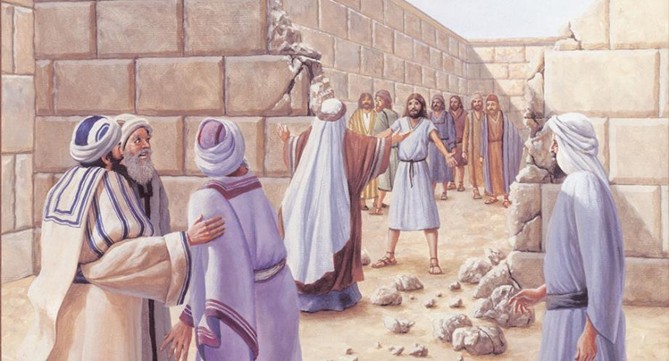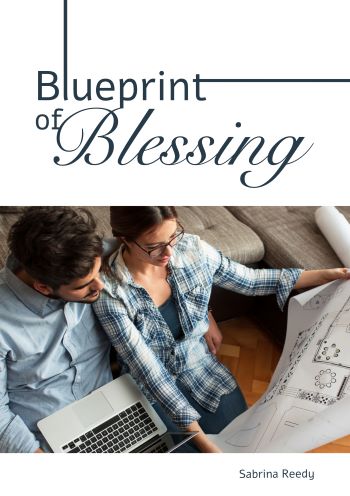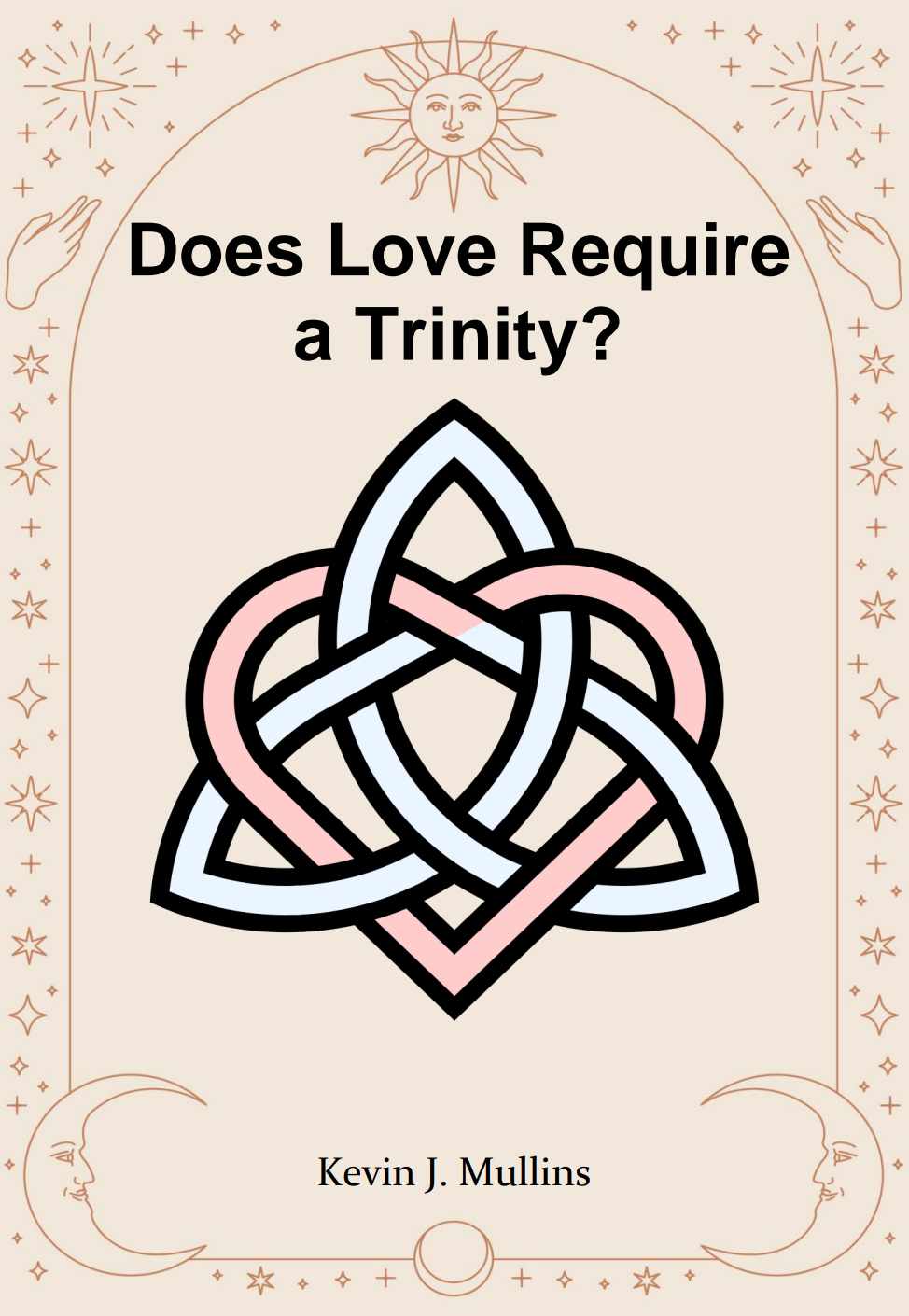(Acts 15) Didn’t the Jerusalem Council Decide that Gentile Believers Do Not Need to Adhere to the Law?
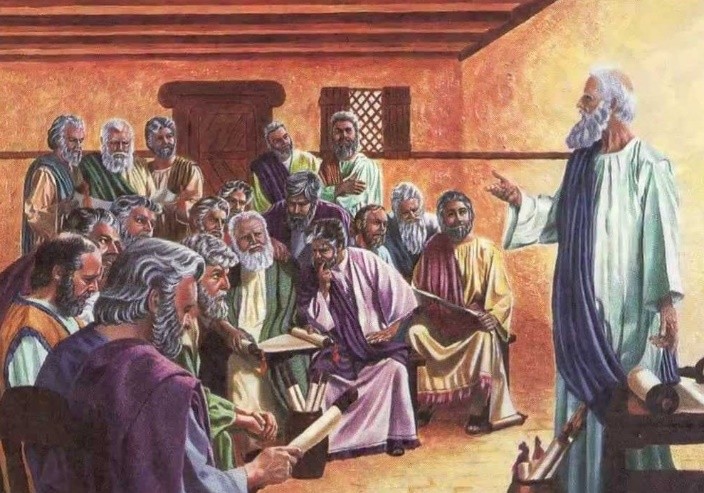 “And certain men came down from Judea and taught the brethren, ‘Unless you are circumcised according to the custom of Moses, you cannot be saved.’ Therefore, when Paul and Barnabas had no small dissension and dispute with them, they determined that Paul and Barnabas and certain others of them should go up to Jerusalem, to the apostles and elders, about this question … And when they had come to Jerusalem, they were received by the church and the apostles and the elders; and they reported all things that God had done with them. But some of the sect of the Pharisees who believed rose up, saying, ‘It is necessary to circumcise them, and to command them to keep the law of Moses.’
“And certain men came down from Judea and taught the brethren, ‘Unless you are circumcised according to the custom of Moses, you cannot be saved.’ Therefore, when Paul and Barnabas had no small dissension and dispute with them, they determined that Paul and Barnabas and certain others of them should go up to Jerusalem, to the apostles and elders, about this question … And when they had come to Jerusalem, they were received by the church and the apostles and the elders; and they reported all things that God had done with them. But some of the sect of the Pharisees who believed rose up, saying, ‘It is necessary to circumcise them, and to command them to keep the law of Moses.’
Now the apostles and elders came together to consider this matter. And when there had been much dispute, Peter rose up and said to them: ‘Men and brethren, you know that a good while ago God chose among us, that by my mouth the Gentiles should hear the word of the gospel and believe. So God, who knows the heart, acknowledged them by giving them the Holy Spirit, just as He did to us, and made no distinction between us and them, purifying their hearts by faith. Now therefore, why do you test God by putting a yoke on the neck of the disciples which neither our fathers nor we were able to bear? But we believe that through the grace of the Lord Jesus Christ we shall be saved in the same manner as they.’
Then all the multitude kept silent and listened to Barnabas and Paul declaring how many miracles and wonders God had worked through them among the Gentiles. And after they had become silent, James answered, saying, ‘Men and brethren, listen to me: ‘Simon [Peter] has declared how God at the first visited the Gentiles to take out of them a people for His name … Therefore I judge that we should not trouble those from among the Gentiles who are turning to God, but that we write to them to abstain from things polluted by idols, from sexual immorality, from things strangled, and from blood.’” (Acts 15:1-2, 4-14, 19-20)
The Key Point of Contention
There are many who conclude from reading the above that the Jerusalem Council decided that Gentile believers do not need to adhere to the Law, specifically the Law of Moses. For example, here’s a snippet from the AI Overview:
“The Jerusalem Council, documented in Acts 15, addressed the inclusion of Gentile (non-Jewish) believers into the early Christian community. A key point of contention was whether these new believers needed to adhere to the Law of Moses, including circumcision. The council ultimately decided that Gentiles were not required to be circumcised or to keep the entire Law of Moses. Instead, they were given four specific restrictions: abstaining from food sacrificed to idols, from blood, from strangled animals, and from sexual immorality.”
First of all, we know the premise of this statement is completely false because the “key point of contention” was NOT “whether these new believers needed to adhere to the Law of Moses, including circumcision”, but what was clearly stated in verse one— the teaching that “Unless you are circumcised according to the custom of Moses, you cannot be saved.” It wasn’t about Law keeping in general, but Law keeping in order to be saved. This is what the Council was against. If the council simply decided that Gentiles were not required to be circumcised or to keep the entire Law of Moses, while overlooking the “to be saved” part, then this suggests that the Jews were required to be circumcised and keep the entire Law of Moses in order to be saved. But again, the contention wasn’t over the Law of Moses in general. It was about who was and who was not saved and how.
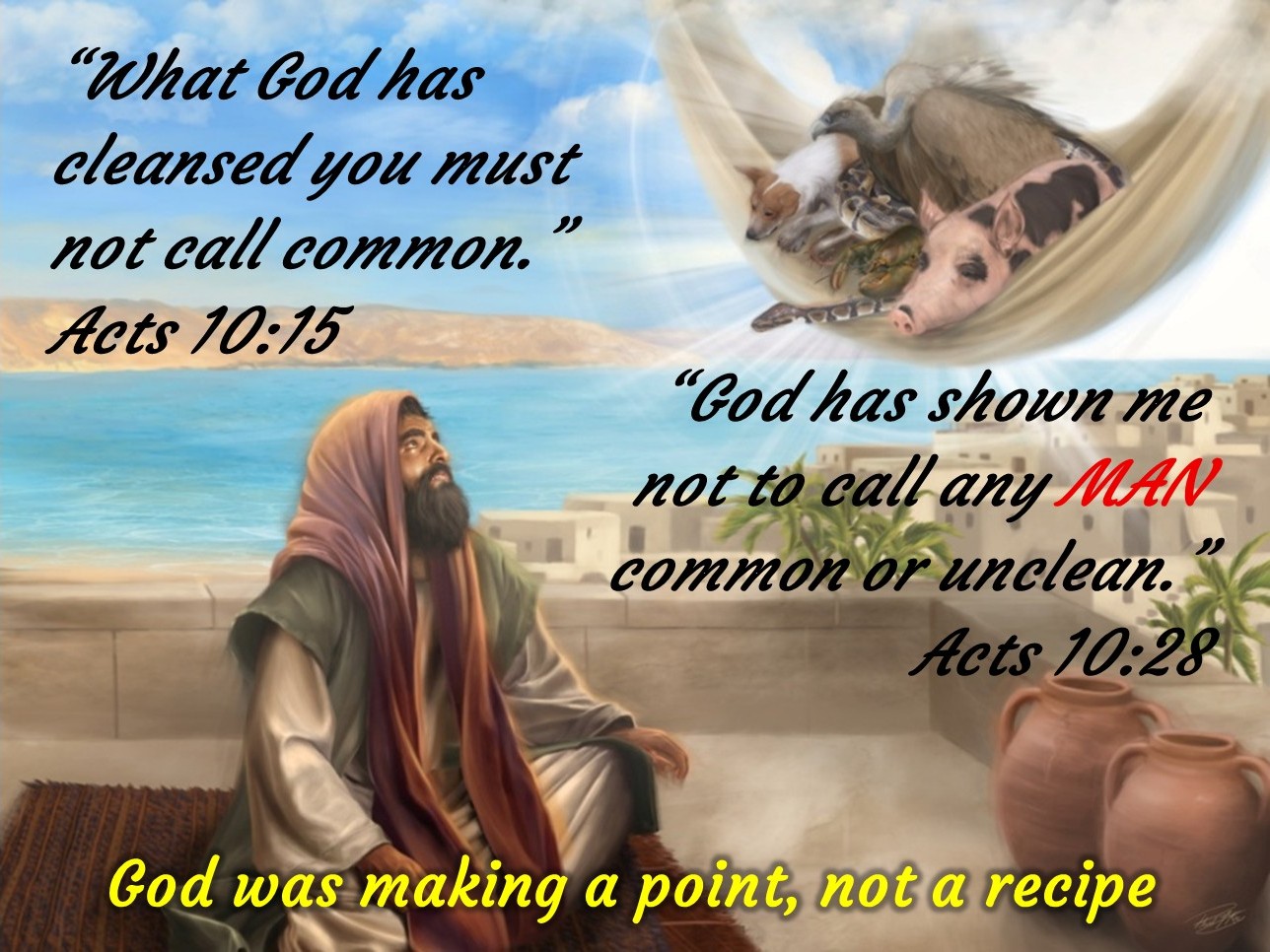 Barnabas, Paul, Peter and James all testified concerning the truth that everyone, Jew and Gentile alike, are saved by grace through faith. When Peter testified in verses 7-11, he reminded them of the events that took place in Acts chapter 10, where God showed him a sheet with unclean creatures and commanded him to eat. Many mistakenly believe that God was changing His dietary Law as if this Instruction was arbitrary, but that’s definitely not the conclusion that Peter came to. He said, “God has shown me not to call any MAN common or unclean” (Acts 10:28). The vision had nothing to do with food, but the Jew’s prejudice against the Gentiles. For a detailed study of this incident CLICK HERE.
Barnabas, Paul, Peter and James all testified concerning the truth that everyone, Jew and Gentile alike, are saved by grace through faith. When Peter testified in verses 7-11, he reminded them of the events that took place in Acts chapter 10, where God showed him a sheet with unclean creatures and commanded him to eat. Many mistakenly believe that God was changing His dietary Law as if this Instruction was arbitrary, but that’s definitely not the conclusion that Peter came to. He said, “God has shown me not to call any MAN common or unclean” (Acts 10:28). The vision had nothing to do with food, but the Jew’s prejudice against the Gentiles. For a detailed study of this incident CLICK HERE.
At the Council, Peter declared, “we believe that through the grace of the Lord Jesus Christ we [Jews] shall be saved in the same manner as they [Gentiles].” This shows that the Jews were never saved by Law keeping. Salvation has always come as a free gift. The “yoke” Peter refers to is not the Law, but the belief that the Law is the means of salvation. It’s putting the cart (the Law) before the horse (Jesus/salvation). However, Scripture is clear that the Law was spoken by God and written down by Moses to point out sin and bring us to Christ who does the cleansing and healing (i.e. saving). Saving us from what? “… you shall call His name Jesus, for He will save His people from their sins” (Matthew 1:21). And, since “sin is the transgression of the Law” (1 John 3:4), then Jesus came to save us from transgressing the Law. Through His indwelling Spirit, He will bring us into harmony again with the Law (i.e. no more sinning). The Horse (Jesus) will be in front of the cart (Law). This is exactly what Paul taught in his letter to the Ephesians:
“For by grace you have been saved through faith, and that not of yourselves; it is the gift of God, not of works, lest anyone should boast.” (Ephesians 2:8-9)
This is where most people stop reading. But let’s read verse 10 together:
“For we are His workmanship, created in Christ Jesus for good works, which God prepared beforehand that we should walk in them.”
The “works” Paul refers to in verse 9 are our works (our self-effort) that we believe save us. It’s the “yoke” that Peter spoke of. The “good works” in verse 10 are God’s works being fulfilled in and through us by His indwelling Spirit. “We are HIS WORKmanship.” God’s grace (His works) which save us come first through faith (our acceptance of His works) and then manifest through us. Therefore, we could say, with all biblical boldness, that we ARE saved by works as long as we realize it is not OUR works but GOD’S! As Jesus, our example, confessed:
“Do you not believe that I am in the Father, and the Father in Me? The words that I speak to you I do not speak on My own authority; but the Father who dwells in Me does the works.” (John 14:10)
“Paul seems to have functioned as a second Moses, not only in providing a profoundly theological interpretation of God’s saving actions in Christ, but also in reminding his readers that salvation comes by grace alone. In Romans and Galatians his argumentation addresses those who would pervert the ‘law’ (a narrow legalistic interpretation of Hebrew Torah) into a means of salvation, rather than treating it as a response to salvation as Moses perceived it. While on the surface Paul’s responses to this heresy often appear to contradict Moses, these statements should be interpreted in context and as rhetorical responses to his opponents. In his own disposition toward the ‘law’ he was in perfect step with Moses: obedience to the law was not a means for gaining salvation but a willing and grateful response to salvation already received.” (Daniel Block, The Gospel according to Moses: Theological and Ethical Reflections on the Book of Deuteronomy, p. 3)
Mingled with this, the “yoke” also involved the ritual of circumcision. Again, not circumcision in general, but the entire ritual of someone converting to Judaism. This conversion process is known as Giyur, which involves several steps and could take weeks and months to complete.
“Giyur is the process of Jewish conversion, a multi-stage journey involving extensive study of Jewish beliefs and practices, immersion in Jewish community life, and formal acceptance by a rabbinic court (Beit Din). Key steps include a period of study, potential circumcision for males, and ritual immersion in a mikvah (ritual bath), all culminating in the candidate's sincere commitment to a Jewish way of life, making them a recognized member of the Jewish people.” (AI Overview)
According to Tim Hegg, “The term ‘circumcision’ is used as a shorthand way of describing proselytism— that rabbinic ceremony by which a Gentile person would be given the status of being a Jew and therefore qualify to have a place in the world to come” (Why We Keep Torah: Ten Persistent Questions, p. 129). The Council rightly decided against this idea and thus Gentiles do not need to go through all of “that rabbinic ceremony” and literally become Jews in order to be saved since that status doesn’t even guarantee the salvation of a native-born Jew who practices Judaism.
The Law of God vs. the Law of Moses
Another reason why many misunderstand what took place at the Jerusalem Council is they separate the Law of God from the Law of Moses, believing they are two distinct sets of Laws. In this mindset, God’s Law is labeled “The Moral Law” of Ten Commandments, while The Law of Moses is labelled “The Ceremonial Law” with all its rituals, feast days, and animal sacrifices etc. One point that must be made clear is that Moses did not come up with his own set of laws. He only wrote down what God had commanded him:
“‘If you sin unintentionally, and do not observe all these commandments which the Lord has spoken to Moses— all that the Lord has commanded you by the hand of Moses, from the day the Lord gave commandment and onward throughout your generations— then it will be, if it is unintentionally committed, without the knowledge of the congregation, that the whole congregation shall offer one young bull as a burnt offering, as a sweet aroma to the Lord, with its grain offering and its drink offering, according to the ordinance, and one kid of the goats as a sin offering.’” (Numbers 15:22-24)
We can clearly see here that these ceremonial offerings are in fact Commandments of God. Just because they were not engraved upon the stone tablets along with the Ten Commandments but were written by Moses in a book, does not mean they are strictly from Moses. For example, Scripture refers to God’s Law as “the Book of the Law of God” (Joshua 24:26). If you would like to read an eBook explaining why God instituted animal sacrifices, CLICK HERE.
Another example of this is found in the book of Nehemiah where we see that both terms are used interchangeably for the one Law:
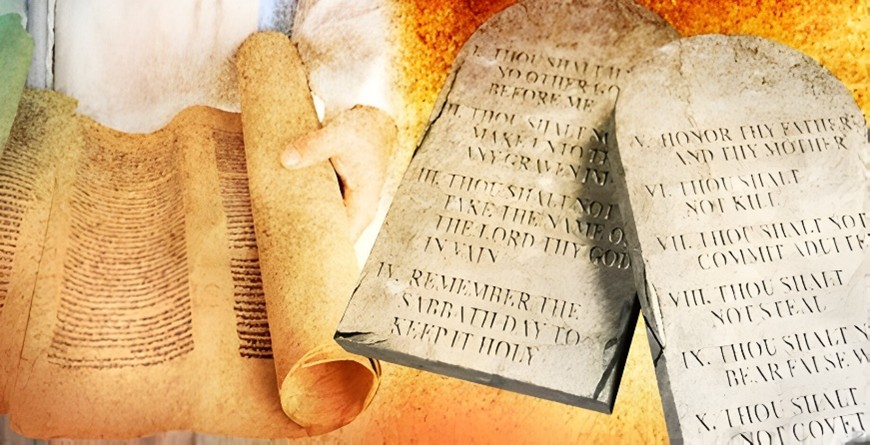 “Now all the people gathered together as one man in the open square that was in front of the Water Gate; and they told Ezra the scribe to bring the Book of the Law of Moses, which the Lord had commanded Israel. So Ezra the priest brought the Law before the assembly of men and women and all who could hear with understanding on the first day of the seventh month. Then he read from it in the open square that was in front of the Water Gate from morning until midday, before the men and women and those who could understand; and the ears of all the people were attentive to the Book of the Law … So they read distinctly from the book, in the Law of God; and they gave the sense, and helped them to understand the reading. And Nehemiah, who was the governor, Ezra the priest and scribe, and the Levites who taught the people said to all the people, ‘This day is holy to the Lord your God; do not mourn nor weep.’ For all the people wept, when they heard the words of the Law … Now on the second day the heads of the fathers’ houses of all the people, with the priests and Levites, were gathered to Ezra the scribe, in order to understand the words of the Law. And they found written in the Law, which the Lord had commanded by Moses, that the children of Israel should dwell in booths during the feast of the seventh month … Also day by day, from the first day until the last day, he read from the Book of the Law of God. And they kept the feast seven days; and on the eighth day there was a sacred assembly, according to the prescribed manner.” (Nehemiah 8:1-3; 8-9; 13-14; 18)
“Now all the people gathered together as one man in the open square that was in front of the Water Gate; and they told Ezra the scribe to bring the Book of the Law of Moses, which the Lord had commanded Israel. So Ezra the priest brought the Law before the assembly of men and women and all who could hear with understanding on the first day of the seventh month. Then he read from it in the open square that was in front of the Water Gate from morning until midday, before the men and women and those who could understand; and the ears of all the people were attentive to the Book of the Law … So they read distinctly from the book, in the Law of God; and they gave the sense, and helped them to understand the reading. And Nehemiah, who was the governor, Ezra the priest and scribe, and the Levites who taught the people said to all the people, ‘This day is holy to the Lord your God; do not mourn nor weep.’ For all the people wept, when they heard the words of the Law … Now on the second day the heads of the fathers’ houses of all the people, with the priests and Levites, were gathered to Ezra the scribe, in order to understand the words of the Law. And they found written in the Law, which the Lord had commanded by Moses, that the children of Israel should dwell in booths during the feast of the seventh month … Also day by day, from the first day until the last day, he read from the Book of the Law of God. And they kept the feast seven days; and on the eighth day there was a sacred assembly, according to the prescribed manner.” (Nehemiah 8:1-3; 8-9; 13-14; 18)
We see the same in the New Testament:
“Now when the days of her [Mary’s] purification according to the Law of Moses were completed, they brought Him [Jesus] to Jerusalem to present Him to the Lord (as it is written in the Law of the Lord, ‘Every male who opens the womb shall be called holy to the Lord’), and to offer a sacrifice according to what is said in the Law of the Lord, ‘A pair of turtledoves or two young pigeons.’” (Luke 2:22-24)
The Instructions concerning Mary’s purification after childbirth are found in Leviticus chapter 12. Luke refers to this as “according to the Law of Moses.” However, when Luke refers to the Instruction concerning “A pair of turtledoves or two young pigeons”, he says it’s from “The Law of the Lord” although it is found in the same chapter of Leviticus (verses 6-8). Even the AI Overview agrees:
“This [offering a pair of turtledoves or two young pigeons] was a provision for those who were too poor to bring the more costly lamb or sheep as a sacrifice … demonstrating that God’s law made gracious provisions for the poor to participate in worship.”
Likewise, the Instruction concerning “Every male who opens the womb shall be called holy to the Lord” Luke refers to, is found in Exodus 13:2. Although many teachers would call this strictly, The Law of Moses, Luke refers to it as “the Law of the Lord.”
You see, to the Hebrew mind, “the Law” refers to the first five books of the Bible, known to them as “The Torah” (Instructions) and “The Books of Moses.” When Jesus said, “Do not think that I came to destroy the Law or the Prophets. I did not come to destroy but to fulfill” in Matthew 5:17, He was referring to the Torah (the five books of Moses) and the writings of the Prophets (such as, Isaiah, Daniel, Jeremiah etc.).
The Four Instructions
Towards the end of the meeting, James, the leader of the Council, said, “Therefore I judge that we should not trouble those from among the Gentiles who are turning to God, but that we write to them to abstain from things polluted by idols, from sexual immorality, from things strangled, and from blood.”
Most people conclude that the Council decided that, in place of The Law of Moses, Gentiles are to keep these four Instructions. What is interesting is these four Instructions for the inclusion of Gentiles among the people of Israel come directly from The Law of Moses. In other words, the Council sought the answer to their predicament straight from the Torah!
- Abstain from things polluted by idols: “They shall no more offer their sacrifices to demons, after whom they have played the harlot. This shall be a statute forever for them throughout their generations.’ Also you shall say to them: ‘Whatever man of the house of Israel, or of the strangers who dwell among you, who offers a burnt offering or sacrifice, and does not bring it to the door of the tabernacle of meeting, to offer it to the Lord, that man shall be cut off from among his people.” (Leviticus 17:7-9).
- Abstain from blood: “And whatever man of the house of Israel, or of the strangers who dwell among you, who eats any blood, I will set My face against that person who eats blood, and will cut him off from among his people.” (Leviticus 17:10).
- Abstain from things strangled (improperly slaughtered): “And every person who eats what died naturally or what was torn by beasts, whether he is a native of your own country or a stranger, he shall both wash his clothes and bathe in water, and be unclean until evening. Then he shall be clean. But if he does not wash them or bathe his body, then he shall bear his guilt.” (Leviticus 17:15-16). Note: meat that has not been properly slaughtered and does not have the blood drained in the traditional method is considered meat that has been strangled.
- Abstain from sexual immorality: The entire chapter of Leviticus 18.
 From their earliest childhood, Jews would memorize the entire book of Leviticus. Here, James proposes that they not trouble the Gentiles with all the traditions, but to ease them in by introducing them to Leviticus chapters 17 and 18 (of course, there were no chapters and verse numbers at that time). It’s hard to believe that most conclude that these were the only four Instructions set for Gentile believers. What about stealing? Or honoring your mother and father? Lying? Coveting? In fact, Paul encourages the Roman believers (who are Gentiles) to observe such Commands:
From their earliest childhood, Jews would memorize the entire book of Leviticus. Here, James proposes that they not trouble the Gentiles with all the traditions, but to ease them in by introducing them to Leviticus chapters 17 and 18 (of course, there were no chapters and verse numbers at that time). It’s hard to believe that most conclude that these were the only four Instructions set for Gentile believers. What about stealing? Or honoring your mother and father? Lying? Coveting? In fact, Paul encourages the Roman believers (who are Gentiles) to observe such Commands:
“Owe no one anything except to love one another, for he who loves another has fulfilled the Law. For the Commandments, ‘You shall not commit adultery,’ ‘You shall not murder,’ ‘You shall not steal,’ ‘You shall not bear false witness,’ ‘You shall not covet,’ and if there is any other Commandment, are all summed up in this saying, namely, ‘You shall love your neighbor as yourself.’ Love does no harm to a neighbor; therefore love is the fulfillment of the law.” (Romans 10:8-10)
Here, Paul quotes several Commands from the Ten Commandments, but when he says, “You shall love your neighbor as yourself”, he’s quoting Leviticus 19:18— “You shall not take vengeance, nor bear any grudge against the children of your people, but you shall love your neighbor as yourself: I am the Lord.”
We can also see from this the true meaning of Jesus’ words, “I did not come to destroy [the Law and the Prophets] but to fulfill” (Matthew 5:17). He didn’t “fulfill” the Law so we don’t have to, He fulfilled it as our perfect example on how to live out these life principles. James says, “If, however, you are fulfilling the royal law according to the Scripture, ‘YOU SHALL LOVE YOUR NEIGHBOR AS YOURSELF,’ you are doing well” (James 2:8; New American Standard Bible). Clearly, we are commissioned to “fulfill” the Law as followers of Christ.
When Jesus spoke of the first and second greatest Commandments in the Law (Torah/Book of Moses), He said:
“‘You shall love the Lord your God with all your heart, with all your soul, and with all your mind.’ This is the first and great Commandment. And the second is like it: ‘You shall love your neighbor as yourself.’ On these two Commandments hang all the Law and the Prophets.’” (Matthew 22:37-40)
Again, these are not new Commandments Jesus is coming up with out of thin air. He’s quoting Deuteronomy 6:5 and Leviticus 19:18. In Mark’s account of this incident, He records Jesus’ words a little differently:
“The first of all the Commandments is: ‘Hear, O Israel, the Lord our God, the Lord is one. And you shall love the Lord your God with all your heart, with all your soul, with all your mind, and with all your strength.’ This is the first Commandment. And the second, like it, is this: ‘You shall love your neighbor as yourself.’ There is no other Commandment greater than these.’” (Mark 12:29-31)
In Matthew’s account, he only quotes Deuteronomy 6:5, while in Mark’s account, he adds verse 4— “Hear, O Israel, the Lord our God, the Lord is one.” This section of the Torah is known as, The Shema.
“The Shema is Judaism's central declaration of faith, affirming the oneness of God, and is recited twice daily. It begins with the Hebrew words ‘Shema Yisrael, Adonai Eloheinu, Adonai Echad,’ meaning ‘Hear, O Israel: the LORD our God, the LORD is One’. The prayer originates from the Torah and emphasizes loving God with one's whole heart, soul, and strength. The Shema is a core expression of Jewish belief in God's singular and unique nature. Observant Jews recite the Shema twice daily, as part of their morning and evening prayers. The Shema is sometimes recited as a final profession of faith by those facing death, demonstrating its profound significance. The Shema is not just a prayer but a summons to live a life devoted to God, with thoughts, words, and actions reflecting this commitment.” (AI Overview)
Also, take particular notice that Jesus said the whole Law (Torah) “hangs” upon the two Instructions to love God and love your neighbor. Considering just the Ten Commandments for the moment, we can see that the first four Commandments instruct us on how to love God, while the last six instruct us on how to love our neighbor. And since “all the Law” hangs on these two, then we can conclude that the Ten Commandments are simply the epitome (summary) of the entire Law (Torah).
What About Other Instructions in the Torah?
Many Christian pastors will warn their congregation about the dangers of alcohol by turning to the example of Nadab and Abihu in Leviticus chapter 10. They will recite the words of God, “Do not drink wine or intoxicating drink, you, nor your sons with you, when you go into the tabernacle of meeting, lest you die. It shall be a statute forever throughout your generations” (Verse 9). However, even though the very next verse instructs us to “distinguish between holy and unholy, and between unclean and clean”, pastors will claim that the Instructions concerning clean and unclean creatures in chapter 11 are abolished. Do Gentile believers in Christ need to stop eating bacon, clams and lobsters or do they have a completely different set of divine Instructions? Are unclean creatures only unhealthy for Jews? And what about the Sabbath and other Feast days outlined in Leviticus 23? Surely Gentiles wouldn’t be observing those “Jewish” things right? Take note to what GotQuestions.org says about this:
“It is interesting that the issue the Jerusalem Council was dealing with is still very much an issue in the church today. There are groups still teaching that Christians must obey the Old Testament Law. Whether it is the Sabbath day or the food laws or all of the Old Testament Law outside of the sacrificial system—there are groups that declare observance of the Law is either required for salvation or at least a crucially important aspect of the Christian life. Sadly, these groups either completely ignore or grossly misinterpret the decision of the Jerusalem Council. The specific goal of the Jerusalem Council was to decide what aspects, if any, of the Old Testament Law Christians must observe. The Jerusalem Council, for the sake of melding the Jewish and Gentile cultures within the Antioch church, said that the Gentiles should eschew their former pagan practices associated with idolatry. There was no mention of the Sabbath whatsoever.” (What was the meaning and importance of the Jerusalem Council (Acts 15)?)
Although I disagree with that entire comment, let's focus in on that last sentence. Is it true that the Council did not mention the Sabbath whatsoever? Let’s read the four Instructions again given by James and notice what he says in verse 21:
“Therefore I judge that we should not trouble those from among the Gentiles who are turning to God, but that we write to them to abstain from things polluted by idols, from sexual immorality, from things strangled, and from blood. For Moses has had throughout many generations those who preach him in every city, being read in the synagogues every Sabbath.” (Acts 15:19-21)
Here’s how the New International Version translates that last sentence:
“For the law of Moses has been preached in every city from the earliest times and is read in the synagogues on every Sabbath.”
Can you see what James is really proposing? The four Instructions are simply a preliminary list to get the Gentiles started on their journey from paganism to knowing the one true God. In fact, what he says about the Law of Moses being read in the synagogues on every Sabbath is part of the solution. It’s a fifth Instruction, encouraging the believing Gentiles to continue attending synagogue every Sabbath and learn more from the Law of Moses (The Law of God— the Torah) as it is read and studied. Over time, they will eventually learn and adhere to all its Instructions, including the Food Laws and Feasts. The English monk, Saint Bede (672/3 – 735) explained it this way:
“Although they are not now weighed down by us with the full rigor of the precepts, nevertheless, as time goes on, in coming together very often for the reading of the law and the prophets, little by little they will receive the principles of life and the rules requiring the keeping of mutual love. For it is very certain that the primitive church, still practicing Jewish ways, continued to use these [readings] in their Sabbath celebrations.” (Saint Bede, Commentary on the Acts of the Apostles 15:21. Francis Martin, ed., Acts, ACCS 5, pp. 187-188)
This is actually something that happens with anyone who begins assembling with a new congregation even today. A new believer does not understand all the doctrines of a certain denomination overnight. They have to gradually learn over time. This is a basic principle found right in the Torah: “Gather the people together, men and women and little ones, and the stranger who is within your gates, that they may hear and that they may learn to fear the Lord your God and carefully observe all the words of this Law” (Deuteronomy 31:12). Paul encouraged Timothy to “focus on reading the Scriptures to the church, encouraging the believers, and teaching them” (1 Timothy 4:13) because “All Scripture is God-breathed and is useful for instruction, for conviction, for correction, and for training in righteousness” (2 Timothy 3:16). Keep in mind that the only “Scriptures” at this time was the Hebrew Scriptures (commonly called today, “the Old Testament”).
It has ever been God’s desire for the Gentiles to take hold of His Sabbath to learn more of Him and His ways:
“Also the sons of the foreigner who join themselves to the Lord, to serve Him, and to love the name of the Lord, to be His servants—Everyone who keeps from defiling the Sabbath, and holds fast My covenant—Even them I will bring to My holy mountain, and make them joyful in My house of prayer. Their burnt offerings and their sacrifices will be accepted on My altar; for My house shall be called a house of prayer for all nations.” (Isaiah 56:6-7)
Take note here, that by observing the Sabbath, the Gentiles (nor the Jews for that matter) were joining themselves to Judaism, but to the Lord! In the Antiquities of the Christian Church, Vol. 2, p. 1138, it says, “The ancient Christians were very careful in the observance of Saturday, or the seventh day … they held religious assembles on the Sabbath, not because they were infected with Judaism, but to worship Jesus, the Lord of the Sabbath.”
God had never designed that the Gentiles observe a different day than the Jews. In the book of Acts we read, “So when the Jews went out of the synagogue, the Gentiles begged that these words might be preached to them the next Sabbath” (Acts 13:42). In response to this, Paul didn’t say, “No, no, you Gentiles are not to observe the Sabbath, come back tomorrow on the first day of the week.” Instead we read, “On the next Sabbath almost the whole city came together to hear the word of God” (Verse 44). In Acts 18, we read, “And he [Paul] reasoned in the synagogue every Sabbath, and persuaded both Jews and Greeks [Gentiles]” (Verse 4).
Some others may argue and say, “Of course they were assembling upon the Sabbath, these references are all talking about ‘Jewish synagogues’ and Paul went there to preach to the non-believing Jews.” However, just because the word "synagogue" is used, it does not necessarily mean it was a non-Christian assembly. In James 2:2, James uses the Greek word συναγωγὴν (synagogue) referring to Christian places of worship. Most translators do a switcheroo and replace “synagogue” with “church”, or “assembly”, or “meeting” for this one verse. Most translators cannot seem to admit that James is talking about a New Testament Christian Synagogue! Here's how the Literal Standard Version translates verses 1-4:
"My brothers, do not hold the faith of the glory of our Lord Jesus Christ in favor by appearance, for if there may come into your synagogue a man with gold ring, in radiant clothing, and there may also come in a poor man in vile clothing, and you may look on him bearing the radiant clothing, and may say to him, 'You—sit here well,' and may say to the poor man, 'You—stand there,' or, 'Sit here under my footstool,' you did not judge fully in yourselves, and became ill-reasoning judges."
Referring to James 2:2 in his Jewish New Testament Commentary, David H. Stern writes:
“This is a Messianic synagogue, a congregation of believers in Jesus, predominantly Jewish, expressing their New Covenant faith in a way retaining most or all of the prayers, customs and style of non-Messianic synagogues … This [blatant mistranslation] reflects the translators' unwillingness to acknowledge the Jewishness of New Covenant faith and the overall antisemitic bias that has infected Christianity over the centuries.” (Words in brackets my own)
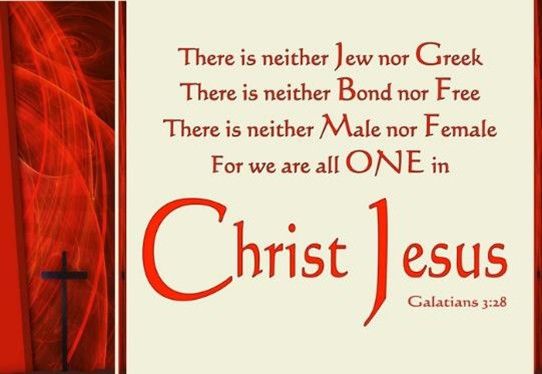 So right here we have a definite confirmation that both Jews and Gentiles were still observing and learning upon the Sabbath day in Christian synagogues to learn more about God’s Law (i.e., The Law of Moses), and thus learn more about the one true God and His only begotten Son, Their true character, and ways.
So right here we have a definite confirmation that both Jews and Gentiles were still observing and learning upon the Sabbath day in Christian synagogues to learn more about God’s Law (i.e., The Law of Moses), and thus learn more about the one true God and His only begotten Son, Their true character, and ways.
“The primitive Christians did keep the Sabbath of the Jews; … therefore the Christians, for a long time together, did keep their conventions upon the Sabbath, in which some portions of the law were read ...” (The Whole Works of Jeremy Taylor, Vol. IX, p. 416 (R. Heber's Edition, Vol. XII, p. 416)
In Acts 20, we see Paul celebrating Passover (the Feast of Unleavened Bread) with the Philippians, which was an assembly in Philippi predominantly Gentile:
“But we sailed away from Philippi after the Days of Unleavened Bread, and in five days joined them at Troas, where we stayed seven days” (Acts 20:6)
“The first Christians being mostly Jews, continued to celebrate the Passover in remembrance of the death of Christ, the true Passover; and this was continued among those who from among the Gentiles had turned to Christ.” (A.T. Jones, Great Empires of Prophecy, pp. 213)
Some may interject here and say, “But what about Acts 20:7 where it says the disciples observed 'the first day of the week', doesn’t this show they began observing Sunday instead of the Sabbath?” Actually, no it does not mean that at all. For a detailed study of this, and to learn of an alternate way of understanding verse 6 as well, CLICK HERE.
I find it very interesting that GotQuestions.com suggests that New Testament Christians do not need to observe the Sabbath because they say, “There was no mention of the Sabbath whatsoever” during the Jerusalem Council. Putting aside the fact that we have clearly seen that this statement is untrue, even if there was no mention of the Sabbath whatsoever, their logic still falls short. Interestingly enough, although most Christian denominations reject the Law of Moses, believing it was nailed to the cross with Jesus, somehow tithing survived even though it’s not mentioned in the Ten Commandments, in the four prohibitions, nor during the Council whatsoever. If there is anything Christians should not adhere to, based upon the logic that it must be mentioned during the Council of Jerusalem, it would be tithing.
Some make the strange argument that we no longer need to observe the Sabbath because the Sabbath is the only one out of the Ten Commandments that is not repeated in the New Testament Scriptures (meaning from Matthew to Revelation). However, even though this is a weak argument to begin with, the Sabbath is actually mentioned nearly 60 times in the New Testament, while tithing a mere 10 times. In fact, according to the AI Overview, “… the command ‘You shall not take the name of the Lord your God in vain’ [Exodus 20:7] appears zero times in the New Testament.” However, it continues by saying, “While the command itself isn’t repeated in the New Testament, Christians are still called to honor God’s name and avoid using it disrespectfully or casually, as this is a violation of the Third Commandment.” No Christian would argue with this logic, so why is it wrong to say, “Christians are still called to remember the seventh-day Sabbath to keep it holy and avoid any labor for personal gain upon that day, as this is a violation of the Fourth Commandment”?
Conclusion
The heart of James’ proposal was at first to bring a quick compromise to the idea that “It is necessary to circumcise them [the Gentiles], and to command them to keep the Law of Moses.” The compromise was, instead of going through all of what the ritual of circumcision and becoming a legal Jew entails, James proposes the four prohibitions. Then, to the idea of commanding them to keep The Law of Moses, he assures them that the Gentiles will learn as time goes by as The Law of Moses is read and studied each Sabbath.
|
Pharisees |
James |
|
Command them to be circumcised |
The 4 Prohibitions |
|
Command them to keep the Law of Moses |
Attend weekly Sabbath to learn more of the Torah |
“Acts 15:20-21 gives us insight into how the apostles expected Gentile believers to relate to the Torah. Rather than requiring circumcision and immediate adherence to the entire Law of Moses, the apostles set forth prohibitions as a starting point for fellowship, with the expectation that Gentile believers would continue to learn and grow in their obedience through regular synagogue attendance. This interpretation aligns with the broader portrait in Acts, which repeatedly depicts Gentile believers attending synagogue services and hearing the Torah proclaimed on the Sabbath. Far from dismissing the role of the Torah in the lives of Gentile followers of Yeshua [Jesus], the Jerusalem Council provided a means for their immediate inclusion in the Christian community as well a path for their continued growth in Torah observance.” (119 Ministries, Moses is Proclaimed Every Sabbath in the Synagogues)
This is why Paul, after saying we are God’s worskmanship unto good works in Ephesians 2:8-10, says,
“Remember that at that time you [Gentiles] were separate from Christ, alienated from the commonwealth of Israel, and strangers to the covenants of the promise, without hope and without God in the world. But now in Christ Jesus you who once were far away have been brought near through the blood of Christ. For He Himself is our peace, who has made the two one and has torn down the dividing wall of hostility by abolishing in His flesh the law of commandments and decrees. He did this to create in Himself one new man out of the two, thus making peace and reconciling both of them to God in one body through the cross, by which He put to death their hostility. He came and preached peace to you who were far away and peace to those who were near. For through Him we both have access to the Father by one Spirit. Therefore you are no longer strangers and foreigners, but fellow citizens with the saints and members of God’s household, built on the foundation of the apostles and prophets, with Christ Jesus Himself as the cornerstone.” (Ephesians 2:12-20, Berean Standard Bible)
Before we close, let us briefly discuss what Paul means when he says the “law of commandments and decrees” were torn down by Christ. Most conclude Paul is referring to the Torah; however, the Greek word used here is δόγμα, which simply means “dogma” in English. This Greek word is NEVER once used for anything related to God’s Law in the Septuagint (The Greek translation of the Hebrew Scriptures). Every occurrence of “dogma” in the Greek Old Testament refers to man-made decrees or rulings. Most often it’s the decrees and judgments of pagan rulers. What Paul is referring to are all the man-made ordinances and teachings developed from a misapplication of God’s Law. These decrees, developed by the religious leaders, separated the Gentiles from the Jewish believers thus creating a “dividing wall of hostility” between both groups. This misuse of the Law is what Jesus tore down, and one example we have already referred to is found in the story of Peter’s vision of the sheet of animals in Acts 10. The “dividing wall” God needed to tare down in Peter’s mind was his belief of “how unlawful it is for a Jewish man to keep company with or go to one of another nation” (Acts 10:28).
Although this dividing wall is applied metaphorically, in the second temple, a wall was literally built to restrict Gentiles from the more sacred parts of the temple along with an inscription warning Gentiles to stay clear under penalty of death:
“The inscription at the temple, known as the Temple Warning inscription or Soreg inscription, was a warning to Gentiles not to enter the temple area. It was inscribed in Greek and Latin on the balustrade outside the Sanctuary of the Second Temple in Jerusalem, stating that no foreigner was to enter the sanctuary under penalty of death. Josephus, a Jewish historian, mentions this inscription in his works, describing it as a sign that forbade Gentiles from entering the holy place. The inscription was discovered in 1871 and is currently housed in the Istanbul Archaeology Museums.” (Wikipedia)
God never commanded such a thing. To the contrary, God welcomed all Gentiles into His presence (Numbers 15:11-15) and made it absolutely clear that “One Law [Torah] and one custom shall be for you and for the stranger who dwells with you” (Verse 16).
